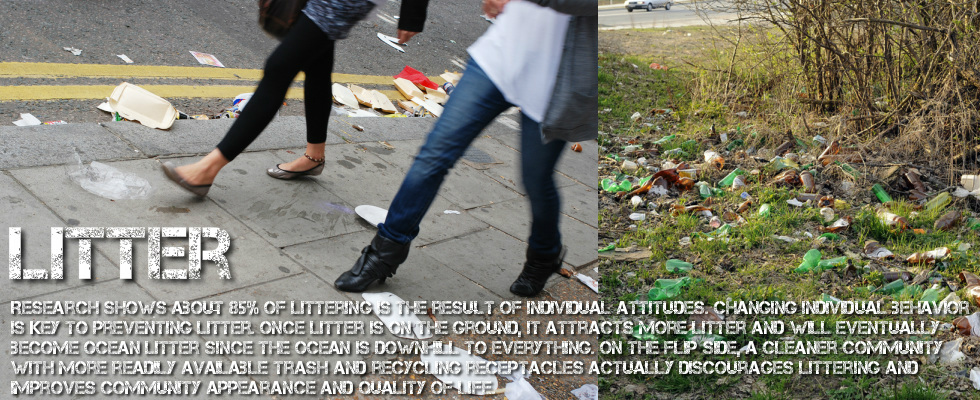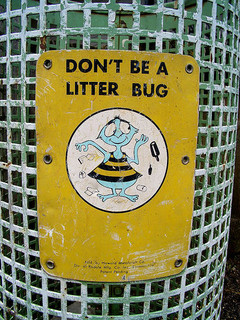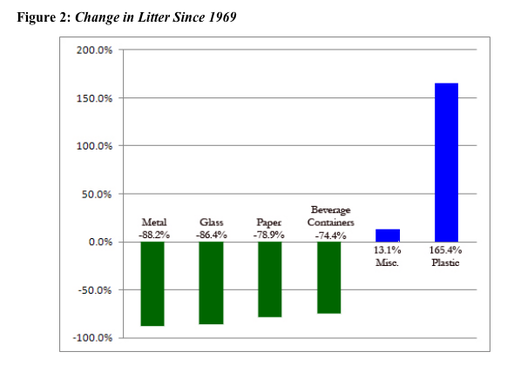
Litter
Litter
consists of waste products, usually man-made objects thrown onto the ground, that have been
disposed of improperly, without consent and in an inappropriate location.
Research shows about 85% of littering is the result of individual attitudes. Changing individual behavior is key to preventing litter. Once litter is on the ground,
it attracts more litter
and
will eventually become ocean litter since the ocean is downhill to everything.
On the flip side, a cleaner community with more readily available trash and recycling receptacles actually
discourages littering and improves community appearance and quality of life. Ultimately, littering is a personal choice that can stem from a lack of personal responsibility for one’s actions and surroundings. Litterers may also have a sense of entitlement, a feeling that other people, especially those who get paid to, should clean up after them.
According to KAB, "Nearly one in five, or 17% of all disposals observed in public spaces were littering, while 83% disposed of litter properly. And 81% of littering was intentional, e.g., flicking, flinging, or dropping. On the other hand, individuals who hold the belief that littering is wrong, and consequently feel a personal obligation not to litter, are less likely to do so. Some people feel no sense of ownership for parks, walkways, beaches, and other public spaces. They believe someone else will pick up after them; that it’s not their responsibility."
Learn more.
Cigarette butts
are the most littered item in the world, with 4.5 trillion discarded annually, causing economic and environmental damages and harming the health of humans and wildlife.
Learn more.

Image via flickr user johnjk
Littering Behavior in America: Results of a National Study
Executive Summary: Litter in America
"Litter cleanup costs the U.S. almost $11.5 billion each year, with businesses paying $9.1 billion. Governments, schools, and other organizations pick up the remainder. Community economy and quality of life suffer. The presence of litter in a community takes a toll on quality of life, property values, and housing prices. KAB’s 2009 National Visible Litter Survey and Litter Cost Study found that litter in a community decreases property values 7%." ~ Keep America Beautiful
Litter is more than just an unpleasant view along city streets and highways. Litter pollutes waterways, leaches toxic chemicals into soil and groundwater as it breaks down, reduces the aesthetic appeal of public places including streets, parks and waterways, can kill aquatic life directly (e.g. through choking or consumption) and indirectly through its impacts on water quality. Every piece of litter
damages the economy and environment,
poses threats to wildlife
and can
harm human health. Littered items are a lost resource. When items that could otherwise be recycled, like plastics, glass bottles and paper, are littered, they do not end up in the recycling stream.
We must significantly reduce the amount of litter in our environment
to protect the health, safety and visual quality of the environment, people and wildlife.
Learn more.
"There aren't many things that are universally cool, and it's cool not to litter. I'd never do it." ~ Matthew McConaughey
Marine Litter - Trash that Kills
"Over 51 billion pieces of litter land on U.S. roadways each year. Most of it, 46.6 billion pieces, is less than four inches. Litter has environmental consequences. Wind and weather, traffic, and animals move litter into gutters, lawns and landscaped areas, alleyways, and parking structures. Debris may be carried by storm drains into local waterways, with potential for serious environmental contamination." ~ Keep America Beautiful
Reduce Waste



